Circle Tour, Eva Tihanyi’s ninth poetry collection, seeks and celebrates beauty in the face of despondency. Its three sections—Outer Circle, Inner Circle, Centre—draw us in as we move from the “outside” world of politics, culture, and art to the “inside” world of relationships with family, friends, and lovers, to the “core” world of the self.
The book begins with a stark announcement of hope: “If you’re reading this, / you’re still here.” It then moves to engagement with (among other things) the pandemic, feminism, and artists such as Marina Abramovic while reinforcing the healing power of Nature throughout our experiences with external, beyond-our-control circumstances. In the more personal second section, Tihanyi writes about loss through death; the continuing influence of her grandmother; the end of one love moving into a new, more profound love; the importance of friends, reminding us that “each day we must be / lucid with mutiny against despair.” The final section focuses on the self—not just the poet’s own but the universal human Self. It confronts the process of aging and its attendant contemplations, and once again reminds us of how Nature and art can help us in our “continuous becoming.”
The poems in Circle Tour invite a sequential reading as the book gathers force as it spirals upward. It takes us on a powerful journey that ends with the ultimate affirmation that leads us full circle to our present moment: “Enough on this day / to be enormously alive.”
“In Circle Tour Eva Tihanyi not only poses the question, what does it mean to make art and meaning in an uncertain world? she pulls us into this question and the act of questioning. “The artist is more than present” in these poems, but—more than that—we are invited to be present too. A journey through the concentric circles of Tihanyi’s carefully structured book is a coming-to-presence. Circle Tour is a powerful collection that challenges us to rethink the nature and potential of lyric poetry as a mode of human contact and imaginative response.”
—Johanna Skibsrud, author of The Description of the World, The Poetic Imperative: A Speculative Aesthetics, and the novel The Sentimentalists (winner of the Giller Prize).
“A lyrical, big-hearted celebration of what it takes to remain whole and hopeful, come what may.”
—Rona Maynard, author of My Mother’s Daughter and former Editor of Chatelaine
“Eva Tihanyi has done for stalwart love what Sylvia Plath did for despair. She examines it from every angle. She chronicles pain she has suffered in the past, and then does a stellar job of recounting how she left it behind. Circle Tour is erudite, uplifting, and completely honest.”
—Catherine Gildiner, author of Good Morning, Monster and the three-volume memoir Too Close to the Falls, After the Falls, and Coming Ashore
(from Section One – Outer Circle)
ENCOUNTER
1.
Here you are.
I’ve been waiting.
Will you let me
share the wind’s call, the life-force
of keen greening, the all-seeing sun
as it summers down
on the needy world?
Will you stay by my side
as all the things we’ve lost
fall upon us, their weight gaining
in the treacherous hours of night?
Will you enter into
the no-turning-back of love,
eyes open, your will free,
your hands reaching?
What will be your stance
in our unchosen world?
The sky stirs,
the shadows stretch.
There is time in everything.
2.
The words hide
but we must find them.
It’s an earnest business,
manufacturing truth, the grand edifice
of power.
Everything comes, leaves,
season by season.
Have you noticed?
There are those
who revel in their vile chaos,
and whatever was for years
slouching toward us
is now irrevocably born.
It hurts, this darkness.
Did I tell you?
The fear welled up in me
and I cried.
But then the carapace of longing broke,
and I subsided.
DO YOU KNOW
The world is more fucked up than it’s ever been.
Do you know the oceans are drowning in themselves,
the sun is eating itself alive?
That deaths are coming faster than you can count,
and every day there’s a new lie about solutions?
Do you know you’ll be outlived
by glass and metal, Styrofoam and plastic?
That the conjunction of planets
and the alignment of stars don’t matter?
Do you know that unequivocal Power
considers itself holy?
That fate decreed you favoured,
gave you choices, conferred your worth?
Do you know that if you wreck yourself
on the rocks of language, you’ll continue bleeding?
(from Section Two – “Inner Circle”)
COURAGE
My poetry wanted them
and so they came, the tumultuous hours,
the bouts of love, the obsessions
like a fever.
Throughout it all, there you were,
friend of a lifetime, watching me
wend my way to adulthood,
my complex relationship with doors.
But the capricious moods of time,
inevitable, insistent as waves on rock,
wash over us, wear us down.
And the selves we were, less visible
with each passing year, recede
and diminish.
You knew me then,
you know me now.
To the end this will sustain me.
Come, let us link arms,
whistle bravely
into the gaining dark.
CONVERSATIONS WITH MY SON
1.
I carry your history within me,
the things only I can remember,
the versions of you that only I know.
Everyone else has died
or was never there.
2.
It’s not easy to be the parent or the child,
to admit the hard words or to listen.
I say: I want you to know me
but there’s no such thing
as a perfect knowing.
And so we settle for less,
a compromise of understanding.
3.
You text about the sparrows
that come daily to your balcony feeder,
the stray cat that finds your lap
on a city patio, sleeps there for an hour.
Of this I’m certain:
if a doe crossed your path
she wouldn’t be afraid,
would move on her slender legs
into your light.
And I pray to the powers that be:
Let this light prevail.
The world needs kind men.
4.
We agree that it’s hard
to collate the days into meaning.
I can’t teach you happiness
but I can guess at what it’s not.
5.
We exchange quotes.
You send Chomsky:
The general population doesn’t know
what’s happening, and doesn’t even know
that it doesn’t know.
I send Whitman:
There will never be any more perfection
than there is now.
6.
To return is to acknowledge;
to acknowledge is to return.
We talk about death, your father’s
the month before you turned thirteen.
Twenty years later you visit his grave.
Healing is a long story
and this one belongs to both of us.
7.
I remind you: each day we must be
lucid with mutiny against despair.
It will change your life,
which dark you choose, which light.
(from Section Three – “Centre”)
SHE
She is like darkness
but she isn’t dark.
She arrives unbidden, stark
and moving, a singer of dreams,
a seer of secrets.
Through her I discover promise
and meaning, the fragility of love.
She is in me and of me,
amusing muse, harbinger of music,
a girl, a woman, a feral crone.
It takes me years to recognize her,
even longer to understand
that she’s unfounded and whole,
a sacred ubiquity
that no mirror can reveal,
no death encompass.
INCIDENTAL CONTEMPLATIONS
1.
I am small and immense,
plural.
Like Whitman
I contain multitudes.
You who hold me now
will hold another me
later.
2.
Change:
the beating heart of things.
Think of Pompeii
buried, excavated.
The shards of jugs,
the fine mosaics,
the frescoes of earthly heaven.
Consider:
the small box your grandfather made,
the dance of his dexterous hands
held in the wood.
A lit match could transform this
forever.
3.
And then there are the words.
I too am a guilty trapper
but oh to free them!
To pry open the gates of meaning
and let the wild words run
exultant as horses.
4.
One thing I’ve learned:
you can’t impose your foot
on the river.
5.
I count my ballasts
and my balances,
am found wanting.
It has occurred to me that
I don’t do well in captivity.
I’m an escape artist
struggling with the tropes.
Maggot or magus?
Who decides?
6.
In the museum
we forget
that things once ran.
7.
Cavort, caress, don’t cower.
Trust the hawk swoop,
the shooting green tendril.
Do the sun work that can be done
only in the light.
Like the relentless windblown waves
keep on cresting, crashing,
coming back for more.
8.
I wish for lucid dreams.
I long to ask the birds
the colour of their waking.
The day is a trickster
and there’s so little that I know.
9.
Moment by moment
time captures us.
But truth is not transient
and in these deviant days
what haunts us will survive.
10.
Daily we make
the pilgrimage toward hope
(far away
though often rumoured).
Daily we admire
the crooked spine of love,
how it teeters, tries
to hold us up
in this lonely world.
Then the shock of stars
when the night clears,
and we happen, for a moment,
to look up.

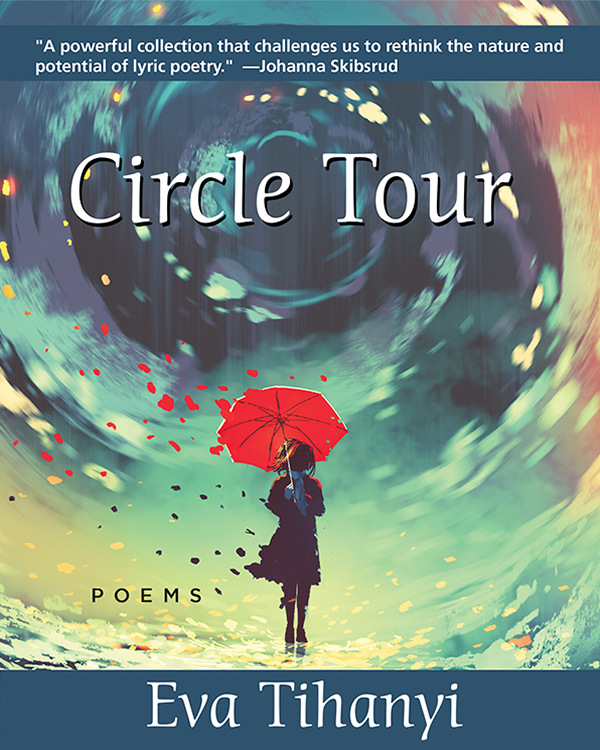

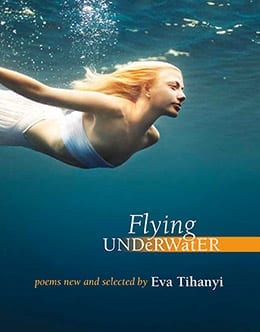
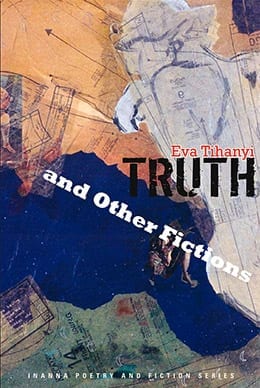
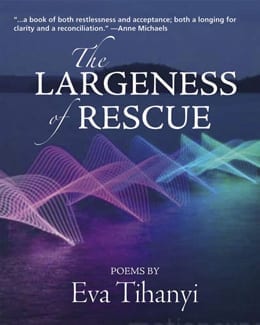
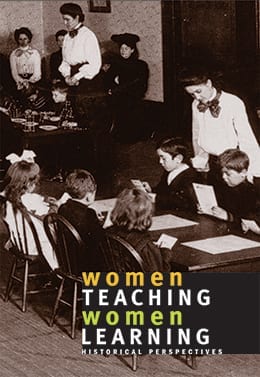

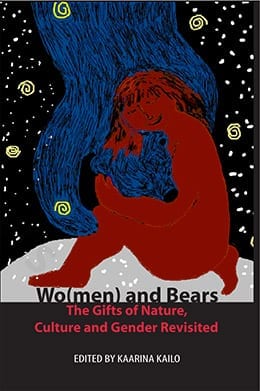
Inanna Admin –
Circle Tour by Eva Tihanyi
reviewed by WordCity Literary Journal – May 3, 2023
https://wordcitylit.ca/2023/05/03/eva-tihanyis-circle-tour-a-review-by-anne-sorbie/
Circle Tour is a like a reflection in lake water; something so beautiful that you wish you could hold on to it, mercurial as it may be.
On these pages Eva Tihanyi offers a bounteous continuation of the language and imagery of the Romantics; and hers is a potent lyrical poetry. At the same time, this collection, is quite literally, one woman’s observations and introspections during the pandemic.
We are shown histories, celebrations, the new normal. The darkness and the growing light that penetrates after it exhausts itself. Meditations, incantations, contemplations. Every one of them beyond wonderful. Each written in such a way that the book insists we hold it, consider its pages, and stay. Once I did close the covers, I felt a lingering desire to return to the words that are drawn so strikingly between them. I felt acutely, the pull and float of a spiral, its way of positioning us in that which is universal. Within hope. Within optimism. Within every aspect of love. Because, at the cellular level Tihanyi’s collection is experiential. Her language, precisely focused.
The poems in Circle Tour are offered in sections: Outer, Inner, and Centre. So that we journey with the poet, universally, personally, and intimately, until ultimately, we are linked to (ways of) being, and to the very essence of “I am.”
We are with her in the natural world – and by that I mean deeply inside the elemental and organic ‘places’ she / we turn to instinctively. Witnessing all the while, anger, loss, and. The inevitability of our own beautiful fate. Until we reach the most unsettling of concepts: the unbearable lightness of being (Kundera) and the ideas that all is ephemeral, that nothing is fixed.
Circle Tour begins in the Outer circle with “Hope,” and with these two lines: ‘If you’re reading this / you’re still here.’ The language is direct and at the same time it begins a rhetoric of metaphorical and literal expectation, of anticipation, of optimism, moving us forward with the speaker while questioning what we see and understand. “The Eye Is The First Circle,” begins with this stanza:
In time we confront
the circle of our story—
or is it a spiral…? (4)
And already Tihanyi’s collection touches the philosophical and the ideas of wholeness, spiritual development, and our connection to that which we identify as universal. In “The Given,” the speaker says, ‘In the beginning there is always a road / but all roads end, and time owes us nothing’ (5). The weight of the words is immediate, and the reader understands that there is nothing sure in this world.
Each poem in Circle Tour is an erudite offering, an accomplished work, which is imbued with significant meaning and with a linguistic power that evokes and provokes feeling and thought. Tihanyi is working in the tradition of Keats and Wordsworth, Blake, and the Shelleys in ways that are sometimes forgotten in conversations about poetry and poetics. Her “Eclipse,” is absolutely beautiful and shows us how ‘The world turns its eyes / to the heavens’ (6), yet just a page later, “A Hellish Season,” ends with the question: ‘What wreckage did you win?” (7).
Tihanyi’s experience of, and response to the pandemic, to uncertainty, and to death is clear in poems like “Resistance,” “Do You Know,” “Celebration,” “The New Normal,” and “Don’t Look Back.” While poems such as “Spring Meditation,” “Here,” and “Summer Reprieve” turn us to nature, to contemplation, and to the kind of slow thoughts isolation has inspired in us during the last few years. In “Experienced Music” we understand the results of anger and frustration in the line, ‘You bay at the world as if it were the moon” (32).
The Outer section refers to Keats, Janis Joplin, Rose-Aimee Belanger, Marina Abramovic, Lisa Brice, and Gloria Steinem ending with the poem, “Despite Everything” and the idea that “Despite everything / we’ll keep going” (44).
The next section titled, Inner moves us to the personal, to thoughts of those lost and those held closely and so warmly loved. “December” is written in memory of Luciana Ricciutelli and will no doubt remind many of her voice and her words. Especially on this line: ‘Dear hearts, keep writing’ (48). So fitting too that “Courage” follows and that other pieces in this section focus on both death and on the act of writing. Later, in “My Mother Annotates a Book of My Poetry” the poet shares finding her mother’s ‘penciled underlining’ in a book, which ‘speaks like a code’ (56). That gorgeous poem took this reviewer to small moments of remembering, to memories of finding her own dead and dear mother’s pencilled stories.
The living also have a place here and in the long poem, “Conversations with My Son,” Tihanyi’s roles as keeper of histories and truths, parent and scribe, show themselves brilliantly through transparent language and acute honesty. She quotes and echoes Whitman with, ‘There will never be any more perfection / than there is now,’ (61) and when she goes on to remind her son and us that in ‘each day we must be / lucid with mutiny against despair’ (62) we are brought again to that idea of the spiral. To our whirling connections, whether emotional, psychological or physical, to all that ailed us in this recently infected world, which still challenges and frightens us with its unbalanced landscape.
In “Broken,” “Indifference,” in “Return,” and in “Acknowledgement,” we feel the incredible reach of love, and once again alongside it, the unsettling and unsettled way we must live as we go forward.
The Inner section concludes with a piece called, “What Is True,” and the rich imagery of kind offerings between human beings that focus on ‘certain beauty,’ ‘recklessness / and a gracious trust that doesn’t diminish’ (70) the best of us. That is, what we are born to be and to do naturally.
The final section, Centre, goes deeper and brings all that sweetens the pages before it together in a gorgeous ‘Tourniquet that keeps blood in,’ in a ‘torque that drives the flow,’ a ‘Glorious paradox,’ a ‘still force’ (75). In this poem, titled “Poetry,” and those that speak after it, like “Beauty in Isolation,” and “Portrait of the Poet as a Young Girl,” Tihanyi’s rhetoric ‘fold[s] in and in,’ ‘fills / the pages with serious joy, / [the] black ink of I am’ (76).
Circle Tour remains, as this reviewer was given to believe at the start, a rhetoric of metaphorical and literal expectation, of anticipation, of optimism. In Centre the poet who speaks so eloquently, so beautifully, ‘is unbound and determined,’ and is one who ‘will not be cajoled out of poetry’ (77). I believe Tihanyi’s words speak for many of us. And nowhere is this truer than in “The Story,” which begins
You wake up knowing
there’s a story that has chosen you:
your mouth, your words.
It assigns
and expects you to deliver.
And which continues a few stanzas later with…
It wants you
to articulate the impossible:
the inflections of shimmering,
the dark universe
before it ignited into stars. (79)
The poems in, Center, that lead us to “Spiral,” the collection’s final piece, are elementally and organically of Tihanyi, and at the same time, universal in their reach.
Johanna Skibsrud says on the cover, “This is a collection that challenges us to rethink the nature and potential of lyric poetry.” Circle Tour does exactly that in the exquisite verses of Eva Tihanyi.
Susan McCaslin –
Circles & Spirals: a Review of Eva Tihanyi’s Circle Tour
A clue to the content of Eva Tihanyi’s ninth volume of poetry, Circle Tour, is provided by her epigraphs by Rumi and Rainier Maria Rilke:
We came whirling out of nothingness,
scattering stars like dust…
The stars made a circle, and in the middle,
we dance.
–Rumi
I’ve been circling for thousands of years
and I still don’t know: am I a falcon,
a storm, or a great song?
–Rainer Maria Rilke
Both authors sing of “circling.” The Persian mystic Rumi affirms our mortality but also our place in the dance of the cosmos, while Rilke, keenly aware of the temporality of our lives, affirms our need to accept the mysteries of an interconnected cosmos. Rilke realized after completing his last poems, The Duino Elegies and Sonnets to Orpheus, that he could face his death with equanimity by releasing himself at the end of his life into his poems.
Circle Tour consists of three sequences: “Outer Circle,” “Inner Circle,” and “Centre.” Together they compose a wholeness that the speaker comes to experience through her lifetime of circling through the dark and light aspects of the temporal world and enacting her long-time dedication to poetry.
“Outer Circle” begins with the gnomic poem “Hope” which states a central theme: how to be present to the world, to the beauty of nature, to oneself:
If you’re reading this,
you’re still here.
From here the sequence moves to “The Eye Is the First Circle” which hints at the relationship of circle and spiral.
In time we confront
the circle of our story—
or is it a spiral really?
“Outer Circle” focuses on the struggles time brings to our “pixilated souls,” which “can’t see their million mirror shards.” Many poems in this section focus on the loss of innocence, human brokenness, sorrows, and the struggles of daily life. Yet even here poetry speaks through the music of a forest, the voices of birds. Even here the soul holds” a calloused trust in the goodness of things” as well as the undeniable presence of beauty. In this section Tihanyi mixes shorter and medium-length poems with long ones like “Experienced Music” where she celebrates Janis Joplin – her loneliness, sorrows, wildness, and the gift of her voice:
In the rude rebellious night, poised
on the edge of your darkest dreaming,
you are safe
in your singing, holy animal.
“Outer Circle” also contains a brilliant series of ekphrastic poems, and concludes with two poems honouring the feminist Gloria Steinem.
The second section, “Inner Circle,” addresses the dark and light sides of families, friends, and past relationships. Tihanyi writes of her deceased grandmother’s ongoing influence , her cherished friends, her mentor Luciana Ricciutelli (deceased publisher of Innana Publications), her difficult father, her inscrutable mother, her later connection with her brother, and her deep love of her son with whom she exchanges quotes and stories, reminding him they “must be/ lucid with mutiny against despair.”
Yet overall, this section celebrates finding a late-life love, whose presence allows the speaker to release her “deepest hurts” (“Indifference”) and embrace “the summer chirring of life” (“Welcome”).
The final section, “Centre,” draws the many strands of this accomplished volume together by focussing on the power of poetry. The opening poem, as in the first section, exhibits Zen-like compression:
Poetry
Tourniquet that keeps the blood in,
torque that drives the flow.
Glorious paradox, still force.
The revelatory power of “Centre” proceeds from the speaker’s memory of being a child in “Portrait of the Poet as a Young Girl,” who comes to reading and embraces the writing of poetry early, who “will not be cajoled out of poetry,” even later when experiencing life’s losses, its continual ups and downs. The long poem “Incidental Contemplations” ends with a revelation of “the shock of stars/ when the night clears, / and we happen, for a moment / to look up.” The speaker comes in “She” to embrace her body, to recognize her deepest interior self: “a sacred ubiquity / that no mirror can reveal / no death encompass.”
In “Transformations,” a poem which becomes more mystical as it reaches its close, we are told that “sometimes the light hides” and the “hard rain” will become “a storm, a deluge.” Yet “impervious,” the poet “a continuous becoming,” knows she “will survive.”
The last poem, “Spiral,” links the beginning and ending of the book to affirm the paradox of the unity of circle and spiral in each of us: “You continue to spiral/ toward an ending/ not yours to call.” The many lyrical poems in the book emphasize hope through acceptance of mystery and entrance into the present moment: “enough on this day/ to be enormously alive.”
Jackie –
Hey, folks! I recently had the pleasure of reading Eva Tihanyi’s latest poetry collection, Circle Tour, and let me tell you, it’s a real gem. This book takes you on a journey through the different circles of life, from the external world of politics and art to the internal world of relationships and finally to the core world of self-discovery.
The poems in Circle Tour are not just beautiful, but they also speak to the soul. The author has a way of bringing out the beauty in everything, even in the face of despair. The book deals with tough topics like loss, aging, and the pandemic, but it does so with a sense of hope and an appreciation for the power of nature and art.
I was particularly moved by the second section of the book, where Tihanyi writes about her grandmother and the importance of friendship. Her words reminded me of the people and relationships that make life worth living. The poems in this section are a tribute to the power of human connection and the beauty of the everyday.
Overall, I cannot recommend this book enough. Tihanyi’s poetry is heartfelt, insightful, and above all, beautiful. She reminds us that even in the darkest of times, there is still beauty to be found, and that we must hold onto hope and keep moving forward. So, if you’re looking for a book that will lift your spirits and inspire you, Circle Tour is a must-read. Thank you, Eva Tihanyi, for this wonderful collection!
Inanna Admin –
Circle Tour by Eva Tihanyi
reviewed by Bryn Robinson
The Miramichi Reader – June 12, 2023
https://miramichireader.ca/2023/06/circle-tour-by-eva-tihanyi/
It’s easy to dismiss “mundane things/cycles and patterns…”, but Eva Tihanyi’s ninth poetry collection urges us not to ignore the lessons in front of us all.
A deceptively simple call to see the extraordinary in the everyday – not the physical environment, mind you, but the emotions scattered across the scenes of our “mundane” lives – the work is constructed and presented in increasingly intimate layers, moving from the broader social observations (Outer Circle), to our relationships (Inner Circle), to the self (Centre). Its use of symbolism is careful and clear, and because of that craftmanship, the poems are not weighed down or clouded with obscure turns of phrase (even as the subject matter becomes heavy). Rather, her language choices make this an approachable volume for the beginner interested in reading more poetry.
Do not be fooled by the accessibility of her words, though. Each re-reading affords a new look into an endless pool, with more to discover. On my own second turn through the collection, I stopped many times at sections I had read already to look up from the pages and consider the insight Tihanyi just shared. One phrase in particular had to immediately shared with my sister; it now ranks among my favourite quotes ever:
“…What he could not destroy between us:
the light of forever connection, bright ampersand.”
What a delicious punch.
Without knowing more about the author than the words on the pages here, it reads like the wisdom of a person who has a healthy respect for painful experiences, but who is strengthened, not discoloured, by it. And with those strong threads, Tihanyi sews each poem together with her calls for mindfulness and promises of a better tomorrow, without being achingly saccharine or disingenuous in its hopes, or ignoring “the past, indelibly present, a haunting watermark”.
When asked, “…why bother with poems about mundane things/cycles and patterns…”, Tihanyi shows us the richness gained by appreciating the “large solace in small things”; by considering that “…each night you re-inherit the stars?”. And I look forward to returning to Circle Tour to see what other treasures I might unearth.
Inanna Admin –
Standing on Shimmer: a review of Circle Tour by Eva Tihanyi
reviewed by Josie Di Sciascio-Andrews
League of Canadian Poets – May 25, 2023
https://poets.ca/review-circle-tour-tihanyi/
They say an image is worth a thousand words: passion, the heart, a woman’s life journey, her gift of words, endurance and her resolve against life’s decohering forces: the cover art of Eva Tihanyi’s poetry collection Circle Tour, perfectly prefaces with allegory her new powerhouse of verse.
Enveloped by the turbulence of a cataclysmic vortex, the dark image of a woman holding on to a red umbrella, faces us undaunted. She stands firm on a scintillating shimmer of turquoise light, as if within the transparent base of a surfer’s wave, her back turned against the pulling dark force. She is safe for now, but for how long?
Is the gyre splintering her umbrella and coat, the event horizon of a black hole? Is it the proverbial tunnel of a near death experience? Could it be an image of one of the theories of time, in which everything has already happened and we return to moments of our lives through wormholes? Or could the poet, like Dante, be standing at the entrance of the circles of hell’s dark grove?
In Dante’s first canto we read “lose all hope ye who enter here,” but instead in Circle Tour we step into the section titled “The First Circle, with a life affirming poem entitled “Hope”, which reminds the reader that “if you’re reading this, you’re still here.” In its briefness, this epigram augurs our only sure hope of being alive.
Following Dante’s analogy, these poems, like life itself emerge as a series of circles of thought and experiences, from inner to outer, much like the pattern of waves created by a stone thrown in water, or the ripples of the years appearing as rings in a tree.
We are alive at the center of it all. In the poem “The Eye is the First Circle,” “it matters how we see it/ when you’re caught in a circle.” We learn that the only “given” in life is that “in the beginning there’s always a road, but all roads end and the world owes us nothing.”
In the poems “Eclipse” and “A Hellish Season” we read that “to take the risk of beauty amidst the sanctioned ugliness” is the poet’s divine art. “It is here we bed down with the miracle worker” , perhaps the poet’s muse. The pen treks “across the uncivilized terrain where predators binge and walls are terminal” and where “there are so many exits into the afterlife”. For all of us “sooner or later tragedy will trump distance” and “what you wish for will make not the slightest difference.”
In “Encounter” the poet alludes to Dante’s unexpected brush with the beast at the entrance of hell. Also as in Yeats’ poem “The Second Coming” we learn that “whatever was for years slouching towards us is now irrevocably born.” We feel the power of this feral animal assailing in the night when “all the things we’ve lost fall upon us/ their weight gaining in the treacherous hours of night” and “it hurts this darkness/ the fear welled up in me and I cried.” Again in this poem though, the poet leans towards the light of positivity rather than be undone by despair: “but then the carapace of longing broke and I subsided.” Even at her most steady centeredness however, there are relapses of emotion. As we read in “Tigers,” “in my sleeping night the tigers groom themselves, inconsolable/ teetering between hope and despair/ they keep vigil for the wild that riots.”
In the poem “Resistance” the poet yields to the mystery of life’s forces. There is a familiar sense of futility in the words “the world is more fucked up than it’s ever been.” Poetry cannot truly save us in the end, although it can assuage the ride. “Did you know that if you wreck yourself on the rocks of language, you’ll continue bleeding?” This is sober eyed poetry. There is no romanticization of reality. “You brandish your small umbrella in the hard fall rain/ know that soon it will be a storm/ a deluge.” In spite of the realization that nothing will prevent catastrophe, there is an incessant drive for the poet to find the words “to articulate the impossible: the inflections of shimmering, the dark universe before it ignited into stars.”
Circle Tour is a brilliant synthesis of deep philosophical concepts about life and the aesthetic of art. The poet, trailing on the star studded vision of classical poetry, leads us along on the concentric circles of the heart, to cohere words into meaning, oftentimes beauty, their only and ultimate aim.
To be alive, connected to the love of others in our life, are affirmations to be for the sake of being. Beyond all loss, love and language redeem and heal. “In your hands I thaw. My heart opens, a crater unfolds at its dark center, and heat glows forth like a buried sun lighting for the first time.”
Eva Tihanyi’s gorgeous language weaves a tapestry of poetic beauty. Resonant with Dante’s “and thence we came forth to see again the stars,” in Circle Tour we read “we came out to see the stars/ humbled by the cosmos/ we stumble into a deep knowing/ ancient fire singing back its holy light to the stars.”
Brainstorming the circle, we whittle down thought to the beginning of everything radiating out in the sacred geometry of creation from one still point. The circle of light waves; the circular shapes of galaxies and planets; the circle of life; the circle of family; of friends; of community; a close knit circle; our circle of influence; we inhabit one point in space radiating out into cycles of time.
“Everything is spirited with light, willing towards beauty.” In the concluding poem “Spiral” we “continue to spiral toward an ending” not ours “to call” and “the heart is revealed deep in the story.” Almost as if reading someone’s secret diary, the poet finds that at the deepest depths of the heart “what you find at the center is never what you expect.” The book ends on a positive note by saying “enough of this day to be enormously alive.”
What will stay with you is the beauty of these poems and most of all their encouragement to live in spite of all odds. In the poem “Conversation with my Son”, the poet gives the most precious advice. “I remind you: each day we must be lucid with mutiny against despair. It will change your life, which dark you choose, which light.”
Inanna Admin –
Circle Tour by Eva Tihanyi
reviewed by The Minerva Reader – July 1, 2023
https://theminervareader.com/library-2023
“What did you try to save?
What wreckage did you win?”
“Would it be enough if you stopped leaning into the future
as if it were an adversary wind?”
A powerful, globally feminist collection of poetry. Unflinchingly direct and ultimately inspiring. Dedicated to Inanna Publisher and Editor-in-Chief, Luciana Ricciutelli.
“Where you are,
there will be dancing.
In the wake of your departure,
A terrible knowing: gone
Means gone.
Dearhearts, keep writing”
There is so much beauty in isolation, the individual as solitary origami. Observations of how stories choose us.
“I create magic; therefore I am.”
A lyrical journey of love, loss and longing, a journal of poetic observations, wise insights and the call to courage. An exploration of grief under a microscope as only Tihanyi can, undiluted by clichés, stripped of social artifice and stitched together with steel threads of hope and bravery.